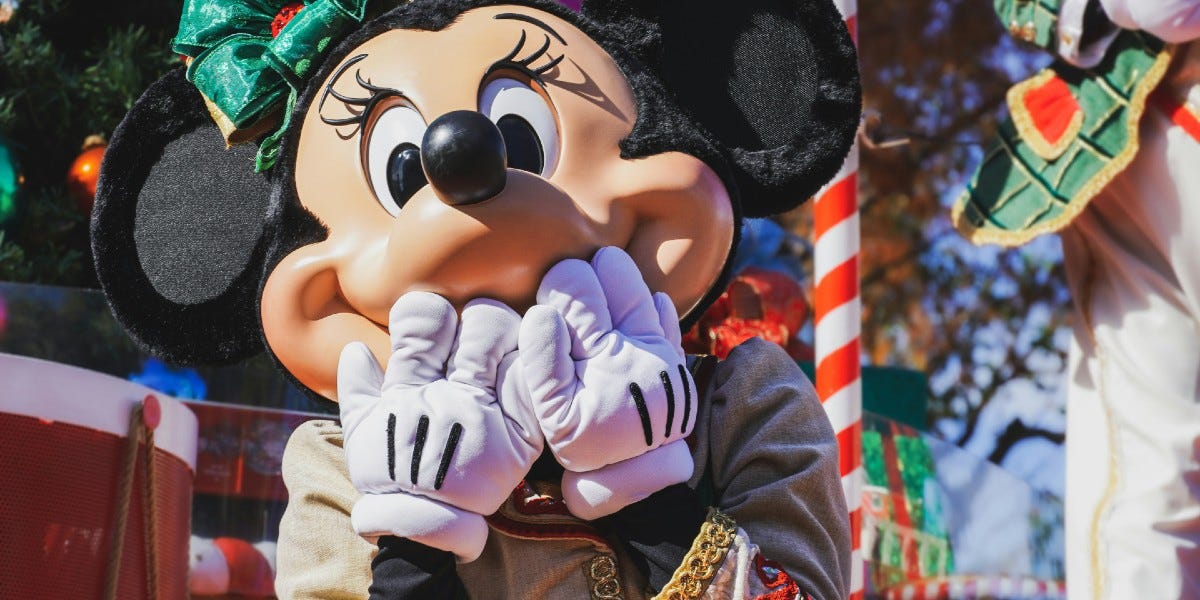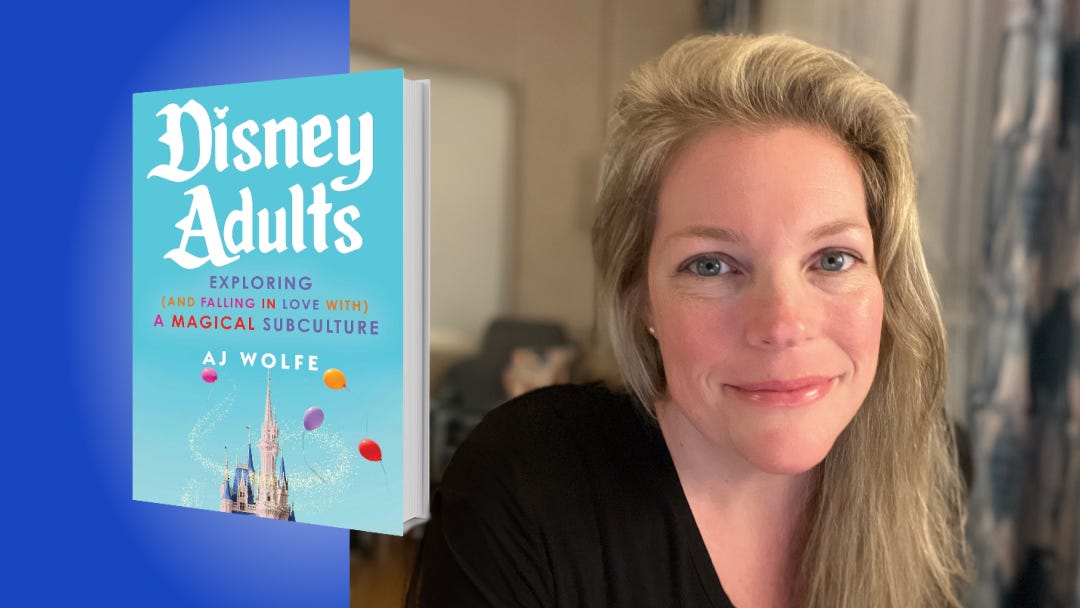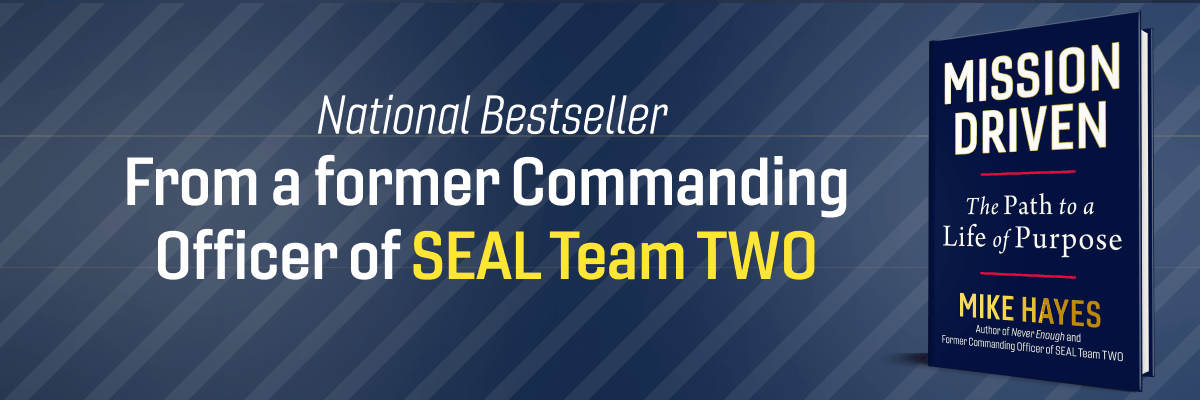It's Time We Talk About Disney Adults
Why a quirky subculture may be a window into our digital lives.
Listen now on Spotify or Apple Podcasts:
What would make a grown man or woman line up for hours to ride Space Mountain, spend thousands on collectible mouse ears, or plan their year around the release of a new Disney churro? To many, it sounds baffling—but to Disney Adults, it’s just joy.
While the Disney brand has long been
AJ Wolfe, founder of the Disney Food Blog and a self-described Disney Adult herself, says these superfans aren’t so different from sports fanatics or Swifties; they’re part of a massive online subculture that reveals a lot about where our digital lives are headed. Her new book is called Disney Adults: Exploring (And Falling In Love With) A Magical Subculture. Pick up a copy on Amazon and check out five of her big ideas below:
1. Everyone is a Disney Adult.
I define Disney Adults as people who are “intentional about interfacing with Disney products and experiences.” They willingly “choose Disney” regularly. But in my experience, everyone has a hobby they love, are truly passionate about, and probably spend too much time and money pursuing.
The developed world (and internet) is full of fandoms, hobby groups, and “tribes” of like-minded obsessives. You just have to figure out which kind you are. Did you spend many hours and hundreds of dollars on Taylor Swift’s “The Eras Tour” tickets? Do you have season tickets for your favorite sports team? Do you have an irrationally thorough understanding of Tudor-era foodstuffs? There is something you love, that you think about regularly, and use your resources to keep it in your life. That’s your relatable starting point for understanding Disney Adults.
2. Online subcultures are the new IRL.
Over the past 30 years, we’ve seen blurring lines between our “in real life” relationships and relationships online. As more communities move online via message boards, Reddit, social media, Discord, and other interactive platforms, it’s very possible that you no longer know your next-door neighbors but have deep, emotional connections with friends you’ve only met through a computer screen.
Disney Adults have found a massive and welcoming community of like-minded hobbyists online—as have football fans, knitters, photographers, and romantasy readers. These types of communities will continue to grow as we embrace new technologies. The jury is still out on whether online relationships and chosen virtual family groups are as healthy and sustaining as those in real life, but as we become a more digital society, we must face that more of our friendships will be online.
“These types of communities will continue to grow as we embrace new technologies.”
What isn’t lost in this move from real life to online life, however, are the echo chambers that develop from tight-knit communities. The term “preaching to the choir” takes on even more fervent meaning in online communities and subcultures, which are getting more and more exclusive.
For Disney Adults, we have a whole language of our own. Only Disney Adults will understand what you mean when you talk about Guardians going down, so you had to move your Test Track lightning lane to Navi River Journey since the only time available was for after you park hopped. Only Disney Adults will understand that when you talk about liking MILF, you, of course, mean Monsters Inc. Laugh Floor.
This week, Book of the Day is brought to you by national bestseller Mission Driven: The Path to a Life of Purpose. Former Navy SEAL commander, White House Fellow, and nonprofit and business leader Mike Hayes offers an inspiring playbook for understanding and achieving your most rewarding and purposeful life. All profits go to support Gold Star Families. Click here to support Gold Star families directly, or order your copy of Mission Driven today.
3. Viral social media amplifies prejudice.
As online communities continue to grow and get big enough to become entire societies—complete with their own hierarchies, social taboos, and mores—the resulting echo chambers grow as well. With online algorithms keyed up to only show you content you’ve expressed interest in previously, you’re less and less likely to be exposed to arguments, belief systems, and mindsets that are alternative to your own.
Once you’re ensconced in your subculture, where everyone thinks as you do and prioritizes what you do, it’s easier than ever to lose sight of important critical voices and dissenting opinions that serve to keep cultures balanced. As a result, behaviors that are perfectly acceptable within your subculture may be utterly foreign and disturbing to those who aren’t part of that community. And if they’re a little over the top, there’s nobody internally who’s going to tell you to tone it down.
Disney Adults won’t be talking each other out of owning multiple baby Yoda dolls and dressing them up so they can go to prom, or deciding it’s cool to quit your job and move to Disney World. Stuff like that might be celebrated in your subculture, but the rest of the world thinks it’s erratic and strange. More extreme members of the Disney Adult community easily become lightning rods for criticism outside of their tribe.
“Behaviors that are perfectly acceptable within your subculture may be utterly foreign and disturbing to those who aren’t part of that community.”
Prejudices you wouldn’t even associate with Disney consciously are affecting the perception of Disney Adults. Because Disney’s goal is to reflect their audience through their storylines, they end up tapping into a lot of topics that you don’t want to bring up with Uncle Phil and Aunt Susan during Thanksgiving dinner. From politics to race relations, from socioeconomics to gender roles, the stereotypes around Disney Adults tend to open doors for more serious bouts of online discourse. And while it’s highly unlikely that someone’s Disney obsession originated from one of these more divisive standpoints, for some, the fandom goes hand-in-hand with where the company stands on serious issues. So, that extreme viral social media post of a Disney Adult might be elevated (because of its connection with Disney) into a political symbol rather than just another human trying to find their happy place.
4. Your “tribe” makes you think stuff is important when it’s not.
While our hobby groups are obsessing even more about what we were already obsessed with, and in the process attracting criticism from beyond the borders of our community, we’re also getting a distorted impression of how important our opinions are.
If everyone else around us is just as obsessed about Taylor Swift tickets, or the NFL draft, or sustainable knitting needles as we are, then, obviously, we think that thing is more important than it is. As a result, we may put more energy, resources, and focus into furthering our goals there than in furthering goals that might be more useful and important in the broader scope of life.
In 2022, Disney World opened one of its most ambitious products ever: The Galactic Starcruiser. This “Star Wars Hotel” experience included a two-night stay in a building with no windows, fully decked out to resemble a Star Wars Starcruiser. This experience was part hotel, part immersive theater, part escape room, part luxury cruise, and 100 percent brand new.
When the Star Wars Hotel was announced, fans were out of their minds with excitement. They knew this would be expensive, but they knew they had to go, no matter what. When the price was officially announced—around $6,000 for two nights—fans rebelled. The outcry online was deafening, and, eventually, if you were excited about the Galactic Starcruiser, you were labeled a shill and a rich elitist in the community.
“When you go along with the tribe and eschew critical thinking, your whole community suffers.”
The Star Wars Hotel was an exquisite piece of engineering, theater, and experiential escape like nothing I’d ever seen before. It was the future of themed experience. Yet it closed one year after it opened, with Disney noting “it didn’t perform as expected.” While many factors contributed to the fall of the Star Wars Hotel, groupthink made it practically impossible for the idea to gain momentum. When you go along with the tribe and eschew critical thinking, your whole community suffers.
5. Online communities influence national, political, and global outcomes.
The Disney Adult community is huge, and getting huger. They have pull and power when it comes to decisions made by Disney. But when a community gets that big, it begins to splinter into subgroups that fall on different sides of hot-button issues.
A good example is the Disney v. DeSantis battle in 2022, launched because of Disney’s faltering response to Florida’s Parental Rights in Education Bill, also known as the “Don’t Say Gay” bill. Initially, Disney made no comment when the bill was introduced. Consequently, employees and fans took to social media to demand that Disney speak up on behalf of the LGBTQ community. When they did as requested, Disney fans rioted with complaints of Disney going “woke.” There was one community with two distinct sides, and Disney was caught in the middle. The growing power of online communities can be good (breaking down gatekeepers and keeping giants honest, groundswell activism, charity, etc.), but there’s a significant chance for digital zealotry.
We’re in the midst of an evolution in online communities that has the potential to wreak havoc or strengthen our global community exponentially. Everyone is a Disney Adult inasmuch as everyone has something they love, stand by, and defend with their time, money, and energy. I’d love to figure out a way for us to use those resources for our collective advantage in the online space.





„Everyone’s a Disney Adult“… love your perspective on it!